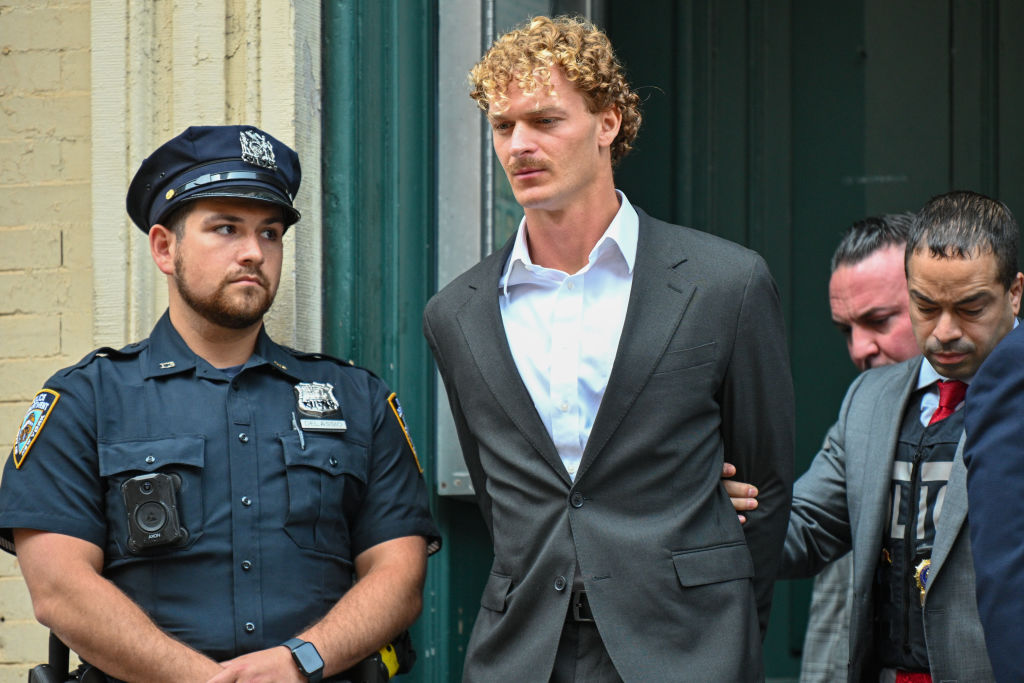(NewsOne) —
Daniel Penny is escorted in handcuffs by the NYPD after turning himself into the 5th Precinct on May 12, 2023, in New York City. | Source: Alexi Rosenfeld / Getty
The criminal trial is underway for Daniel Penny, the vigilante Marine who was charged with second-degree manslaughter after he was captured on video applying a chokehold that allegedly killed 30-year-old unhoused Black man Jordan Neely on a New York City subway train last year. Two hours after Neely died from “compression of the neck,” according to a medical examiner, Penny was interrogated by two detectives in the New York Police Department’s Fifth Precinct, where he minimized the amount of time he held Neely in a chokehold and insisted that if he hadn’t acted, Neely, who hadn’t physically attacked anyone, would have killed one or more of the passengers. Video footage of that police interview was played during a pre-trial hearing in Manhattan on Thursday.
From the New York Times:
In a video of the interview shown in State Supreme Court in Manhattan on Thursday, Mr. Penny told the detectives he stepped in on May 1, 2023, because he felt that the homeless man, Jordan Neely, was acting erratically and “was absolutely killing someone” that day.
On the day of his death, Mr. Neely boarded a northbound train at the Second Avenue station and immediately began to scream, witnesses said.
Mr. Penny, who faces charges of manslaughter and criminally negligent homicide, told the investigators that he had taken Mr. Neely to the ground. Each time he felt a “burst of energy,” Mr. Penny said, he held Mr. Neely more steadily and continued to do so until two men helped pin Mr. Neely down.
“As soon as those guys came in and held him, I let go,” Mr. Penny told the detectives, throwing up his hands and leaning back in his chair.
It’s worth noting that Penny, under questioning, said held Neely tighter every time he felt a “burst of energy,” which seems to mean he admitted to intentionally choking Penny until he was motionless, causing his death — which is exactly what he’s accused of. At any rate, video footage shows he did not let go of Neely even after he stopped moving.
More from the Times:
But a four-minute video made by bystanders from the scene on an F train in Manhattan shows that Mr. Penny in fact continued to hold on. The video shows Mr. Penny with his arms around Mr. Neely’s neck and his legs wrapped around his body. Mr. Neely struggled against Mr. Penny’s restraint, as the other men stepped in. They held on until 50 seconds after Mr. Neely became motionless.
Prosecutors asserted that Penny held Neely in a chokehold for about six minutes and that he was still holding him after the subway train had stopped and the doors had opened, giving the passengers he claimed Neely was “absolutely killing” an exit.
Footage from police body cameras was also played during the hearing. It showed a responding officer who saw Neely sprawled out on the floor of the subway car unconscious asking Penny, “How did he end up in this condition?” to which Penny responded, “I just put him out.” At the precinct, Penny told the detectives, “I’m not trying to kill the guy,” but he insisted he was afraid Neely, who he referred to as a “crackhead” and “crazy person,” would hurt someone.
Penny’s attorney, Thomas A. Kenniff, argued on Thursday that any statements his client made at the scene were obtained illegally and had been “poisoned” because one officer, Sgt. Carl Johnson, had kept him from leaving the subway car, causing him to believe he was under arrest.
“The damage had already been done by the time he had gotten to the precinct,” Kenniff argued.
Dafna Yoran, an assistant district attorney, disputed that argument, noting that Penny was not arrested that day and was free to leave at any time. Prosecutors even asked officers several times if Penny had been placed in handcuffs and the officers answered “no” each time. Yoran also noted that Penny didn’t believe he was under arrest, pointing to the fact that he asked detectives how long the interview would take because he had somewhere to be, directly checking with the officers to ensure “I’m not detained or anything.” (The fact that Neely was dead and Penny admitted to choking him and the attorneys are debating whether or not Penny felt he was arrested as if he shouldn’t have been arrested that day serves as a reminder that our “justice” system might need some tweaks.)
Judge Maxwell T. Wiley, who presides over the case, said he would rule on whether Penny’s statements at the scene were admissible on Friday.
Kenniff also raised the issue of calling a psychiatrist to discuss Neely’s mental illness, treatment history and chronic use of K2, a synthetic drug, all of which prosecutors have argued are irrelevant to the case. Kenniff argued the testimony won’t be used to “disparage” Neely, but it’s necessary because the “public has a right to have eyes on this case, to see what is actually going on here.” However, prosecutors argued that testimony shouldn’t be allowed because state law holds that “a deceased victim’s prior bad acts and psychiatric history are not admissible unless they are relevant to an issue at trial.” Prosecutors called the defense’s request for a psychiatrist’s testimony “a transparent attempt by the defense to smear the victim’s character so that the jury will devalue his life.” It’s unclear if Judge Wiley will also rule on that matter Friday.
According to News Nation, jury selection for the trial is set to begin on Oct. 21.
SEE ALSO:
Jordan Neely’s Family Calls Out NYC Mayor Eric Adams: ‘You Can’t Assist Someone With A Chokehold’
Jordan Neely’s Killer Had Help: Will The People Who Aided And Abetted Daniel Penny Be Charged Too?
—
Read More News from News One
